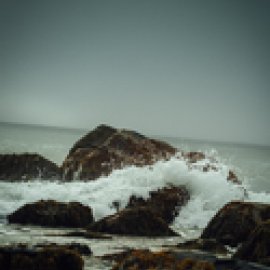RESCUE, part 4: The Fallacy of Denial
-
English
-
ListenPause
[intro music]
Welcome to World Ocean Radio…
I’m Peter Neill, Director of the World Ocean Observatory.
A key problem in advancing a response to the ocean/climate challenge is denial, the action of declaring something to be untrue. If science and observation are presented as a factual analysis of condition, then to be effective if must be believed. If it is not, if it is denied and declared untrue, the counterforce stalls progress by refusal and rejection, and change is forestalled by failed resolution and inaction, the negative obviating the positive, and the status quo maintained to the advantage of those vested.
Despite all the news about the climate crisis and the continuing degradation of the ocean, we are caught in a field of offsetting forces, a dynamic that on the surface appears as an eternal pause, but in effect enables and prolongs the existing values, structures, and behaviors, aggravating and perpetuating the condition. We have described the operative paradigm here before: unlimited growth fueled by consumption of unrestrained production based on fossil fuels. The economic viability of nation states is based on an arbitrary measure, Gross Domestic Product; the factors included in the calculation determined primarily by the interests of private enterprise, not the interests of the public. The argument is familiar and maintained by industry and the markets. Externalities such as public health, repair and reparation, widening divisions between rich and poor, northern industrial and southern agrarian economies. The paradigm is justified as a science of its own, with facts and observations, and for the beneficiaries of the wealth created, there is no imaginable alternative. It makes no difference that the air will be unbreathable by coal, the ocean will be acidified by fossil fuel energy emission, the sea will be without oxygen or food, the toxins and plastic residue will invade our bodies and those of our children. Does our only salvation lie in the depletion, the final exhaustion of those natural beneficial resources? That’s not denial, just stupidity.
Is that changing? Some would argue that, yes, it is, in the face of obvious deleterious consequences of its making: extreme weather, for example, with effects that will wash away a coastal mansion or beach resort as easily and definitively as it will a marginal fishing village or artisanal shoreline garden. The consequences of the paradigm acknowledge no man-made property lines, make no distinction between who lives and who dies in their physical and social impact. The salt pans are flooded, the vineyards are washed away. And, as the reality continues, even the last bastions of defense—the sea walls and insurance policies—fall to the democratic forces of Nature that ignore and overwhelm even the forces of capital. In the face of such facts, real not imagined, denial proves to be worse than useless.
Facts are illusion. If there is no science or observation, there is no problem. If there is no problem, no solution is required. If there is no question, why look for an answer? The fallacy of denial is so stunningly obvious it is a wonder that the deniers do not falter and succumb to a pneumatic deflation of hot air, to collective consummate paradigm embarrassment. Despite all the rationalization by clever argument and all the manipulation by disingenuous ploy, denial must be seen as and reduced to the suicidal choice, simply put, of death over life.
The deniers will dismiss this as histrionic hyperbole. But the facts argue compellingly otherwise. Reverse the thinking from denial to acceptance. Think of truth, denial’s antonym. Think forward. Think of the alternatives. Think of the relief inherent in change. Think of the affirmation in the embrace of a new 21st century paradigm of: managed growth fueled by sustainable practice based on the conservation of the essential value inherent in Nature. Think of that prospect. Think of the economic and social return in the affirmation of a world view that is inclusive, just, and rewarding, that offers opportunity and optimism, hope and benefit for a world so desperate and deserving. Think of our children. Think of their future. Think about a plan for RESCUE: R for renewal; E for environment; S for society; C for collaboration; U for understanding; and E for engagement.
We will discuss these issues, and more, in future editions of World Ocean Radio.
[outro music]
This week we continue the multi-part RESCUE series with observations about the climate future and our relationship to facts and truth, the spread of misinformation, the belief in and skepticism of science, denial, inaction, and vested interest in the status quo. If we are to enact the changes required to move toward a more sustainable climate future, how do we, collectively, turn toward acceptance of scientific fact and affirmation of a new world view? RESCUE as an acronym offers a plan for specific action and public participation: Renewal, Environment, Society, Collaboration, Understanding, and Engagement.
About World Ocean Radio
5-minute weekly insights dive into ocean science, advocacy and education hosted by Peter Neill, lifelong ocean advocate and maritime expert. Episodes offer perspectives on global ocean issues and viable solutions, and celebrate exemplary projects. Available for syndicated use at no cost by college and community radio stations worldwide.
Image
Photo by Tim Foster on Unsplash
@timberfoster
- Login to post comments



